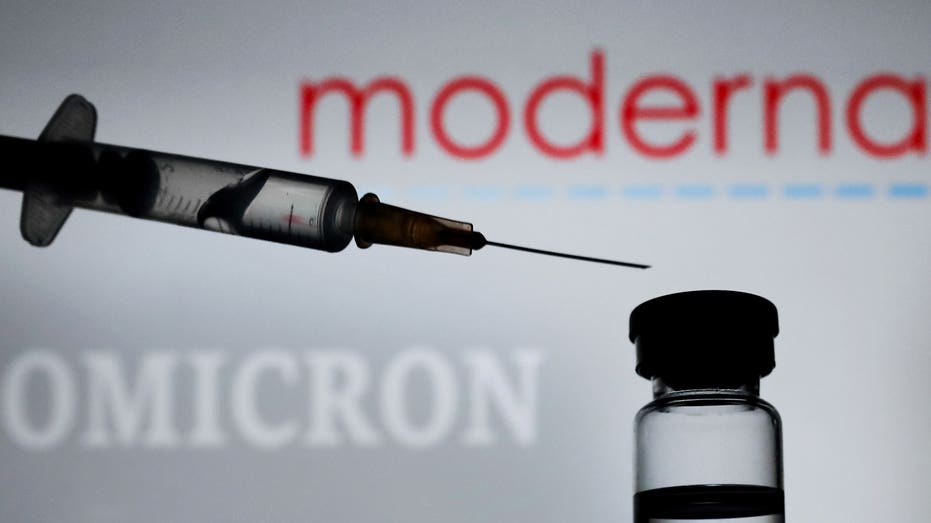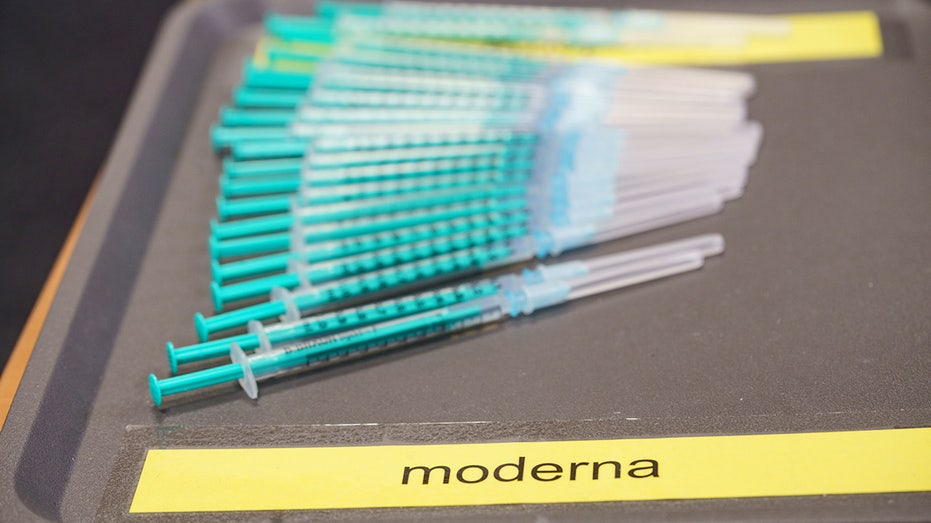Moderna says COVID-19 booster dose works against omicron variant in lab tests
Neutralizing antibodies are among the first soldiers that the immune system deploys to battle invaders like the coronavirus
Fox Business Flash top headlines for December 17
Check out what's clicking on FoxBusiness.com.
Moderna Inc. said a third dose of its Covid-19 vaccine increased immune responses against the omicron coronavirus variant compared with two doses in lab tests, signaling the shot could still offer protection despite the variant’s mutations.
The findings, reported by Moderna on Monday, were the latest positive—though preliminary—results from lab tests suggesting boosters can protect against the worrisome new strain.
The Cambridge, Mass., company said the authorized dosage of its booster shot increased levels of immune-system agents known as neutralizing antibodies against Omicron about 37 times more than pre-boost levels.
Neutralizing antibodies are among the first soldiers that the immune system deploys to battle invaders like the coronavirus.
Omicron variant measures, data making people anxious: Moderna chief medical officer
Moderna Chief Medical Officer Dr. Paul Burton acknowledges while governments are trying to protect health care systems, COVID restrictions over omicron are making people anxious.
"What we showed is when you boost, you get a good brisk increase in antibody levels and they would be correlated with protection," Moderna Chief Medical Officer Paul Burton said in an interview.
The authorized booster shot is half the dose level used for each of the first two shots of the vaccine.
Together with similar results from lab testing by Pfizer Inc. and partner BioNTech SE, Moderna’s findings suggest COVID-19 vaccines designed to fight the virus strain that was predominant during 2020 may still hold up well against variants such as Omicron that are significantly mutated.

Medical syringe is seen with Moderna logo and 'omicron' sign displayed in the background in this illustration photo taken in Krakow, Poland on November 29, 2021. (Photo by Jakub Porzycki/NurPhoto via Getty Images / Getty Images)
Yet people would have to get a booster shot on top of the primary series of vaccinations to gain the protection.
When Omicron emerged, researchers and health authorities expressed concern that the variant could evade vaccines because it has many mutations to the spike protein targeted by the shots.
Adding to their fears was research indicating that Omicron is less susceptible to two doses of Moderna’s and other Covid-19 vaccines.
Lab-test results released last week by a team of researchers from Moderna, the National Institute of Allergy and Infectious Diseases and Duke University showed that two doses of Moderna’s vaccine had significantly reduced neutralization activity against Omicron.

Prepared syringes with the vaccine from Moderna are ready at a vaccination campaign at the headquarters of the Rhineland-Palatinate Hotel and Restaurant Association (Dehoga). Photo: Frank Rumpenhorst/dpa (Photo by Frank Rumpenhorst/picture alliance v (Frank Rumpenhorst/dpa (Photo by Frank Rumpenhorst/picture alliance via Getty Images)
The findings from Pfizer-BioNTech and Moderna are based on lab tests, not the clinical trials in volunteers that are considered more definitive.
NETHERLANDS ‘GOING INTO LOCKDOWN AGAIN’ TO CURB OMICRON
Moderna disclosed its booster results, which haven’t been peer reviewed and published in a scientific journal, in a news release. The company plans to share the data with government health officials.
The Omicron variant was identified in late November in southern Africa and has now spread to many countries, including the U.S.
Early studies suggest it spreads faster and reinfects people more easily than other variants and it evades vaccine-induced antibodies to a greater degree. It isn’t known yet whether Omicron causes more or less severe Covid-19.
CONSUMER CONFIDENCE, HOME SALES, NIKE EARNINGS TOP WEEK AHEAD
The new data may reinforce calls by public-health officials for vaccinated people to get booster shots. In the U.S., only about 29.5% of fully vaccinated people have received booster doses, according to the Centers for Disease Control and Prevention.
CLICK HERE TO GET FOX BUSINESS ON THE GO
Moderna also found that using a full dose for the third shot packed a more powerful punch than the authorized booster dose. A third full dose increased neutralizing antibodies against Omicron about 83 times more than pre-boost levels.
Dr. Burton said government regulators may want to consider recommending the higher-dose boosters to increase protection, at least among people at higher risk of more severe Covid-19.
However, in a separate study, Moderna said people receiving the higher-dose booster had more frequent adverse reactions than those who received the lower dose.
Dr. Burton said the reactions include headache, fever and joint stiffness and should be balanced against the potential benefits of a higher-dose booster.
Moderna also tested other experimental booster shots that target older variants, including Delta, and found they provided a comparable boost to antibody levels against Omicron as its original vaccine booster shot.
Pfizer and BioNTech said a third dose of their Covid-19 vaccine increased neutralizing antibodies against Omicron compared with just two doses.
Given the speed of Omicron’s spread, Moderna said its near-term priority will be to continue making booster shots of its original vaccine available.
It said it would keep working on an Omicron-specific booster shot, in case it is needed. Moderna expects to start clinical trials of an Omicron-specific booster in early 2022.
The new data on Moderna’s booster and Omicron came from lab tests that mix blood samples from vaccinated people with an engineered virus that resembles the Omicron variant. The tests were conducted at Duke University Medical Center labs that were established by the National Institute of Allergy and Infectious Diseases, Moderna said.





















